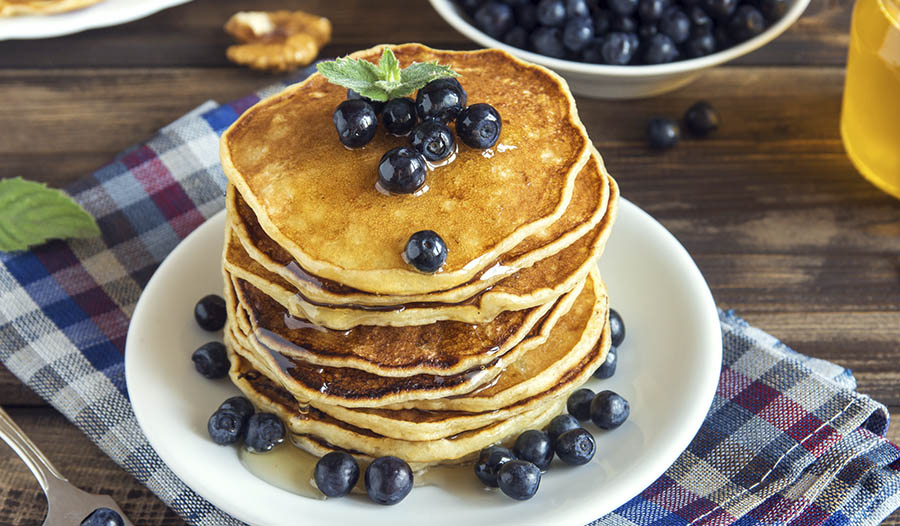How to Cook with Collagen Powder

Collagen is the most abundant protein in the human body and provides the structure in our connective tissue. It’s basically the glue that holds us together. Collagen is found in our bones, tendons, ligaments, gut, hair and nails. Unfortunately, our bodies produce less collagen as we age (this decrease starts early, in our 20s and 30s). Collagen production can also be hindered by certain lifestyle factors such as sun exposure, smoking, and excess sugar and alcohol consumption. Loss of collagen production leads to signs of aging such as thinning skin, wrinkles, joint and muscle pain, and even digestion issues.
Why Is Everyone Talking About Collagen Lately?
It is believed that, by consuming collagen, we can reverse some of the symptoms of aging. Collagen powders and supplements have exploded in popularity recently. But what do the studies say? Research on collagen supplementation is limited, but there does seem to be promise when it comes to improved skin elasticity and wrinkle depth. One study found that women who took the peptide form of collagen regularly for eight weeks saw a 20 percent reduction in wrinkles.
Anecdotally, people have reported healthier hair and nails, improved wound healing, and decreased bone and joint pain after taking collagen.
How Can You Include Collagen in Your Diet?
Collagen can be found in various supplement forms, bone broth, and powders. There are two types of collagen powder: collagen protein and collagen peptides. The main difference between the two is digestibility.
Collagen protein takes longer to digest and gels when mixed with liquid, making it a great thickening agent in recipes. (To use as a thickener, mix with hot liquid and let it cool for 5-10 minutes before adding it to your recipe.) Collagen protein can also be used to add extra protein to omelets, desserts and homemade ice cream.
Collagen peptide powder is easier to digest because the amino acids are broken down from processing. Collagen peptides don’t gel when mixed with liquids, so they blend easily with hot and cold drinks. Many people add collagen peptides to their morning coffee or smoothie.
You can also add collagen peptides to oatmeal, pancakes, waffles or muffins. Or try mixing it into your favorite dip like hummus or guacamole.
Don’t Forget the Vitamin C!
Vitamin C is crucial to collagen formation in the body. If you are supplementing your diet with collagen, but not getting enough vitamin C, you will be missing out on the benefits you’re trying to achieve. Because vitamin C is a water-soluble vitamin, it is not stored in the body, so you need to include it in your diet every day.
The best sources of vitamin C are fruits and vegetables such as bell peppers, broccoli, kiwi, oranges and strawberries. Many collagen supplements also include vitamin C.
Strawberry Kale Collagen Smoothie
Ingredients:
- 1 scoop collagen peptides or hydrolyzed collagen powder
- 8 oz. unsweetened almond milk
- 1 cup frozen blueberries
- 1 heaping cup fresh or frozen strawberries
- 1 packs cup fresh kale leaves
- 1 banana
- 1 tbsp. nut butter
- Dash ground cinnamon
Instructions:
- Add all ingredients to a blender and blend until smooth.
Collagen Protein Pancake
Ingredients:
- 3 eggs
- 1/4 cup unsweetened almond milk
- 4 tbsp. coconut oil, melted (1 Tbsp. reserved for cooking)
- 1 tbsp. pure maple syrup
- 6 tbsp. collagen peptide powder
- 1/3 cup + 2 tbsp. coconut flour
- 1/2 tsp. baking soda
- 1/8 tsp. salt
Instructions:
- In a large mixing bowl, whisk together eggs, almond milk, 3 tbsp. coconut oil, maple syrup and collagen powder.
- Add the coconut flour, baking soda and salt. Mix well.
- Heat remaining tablespoon of coconut oil in a large pan over medium heat.
- Using a ladle, scoop about 1/4 cup batter onto the pan and cook until both sides are golden brown.
DISCLAIMER:This Wellness Hub does not intend to provide diagnosis...
















































































